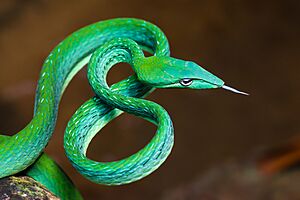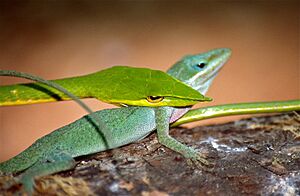Ahaetulla prasina facts for kids
Quick facts for kids Ahaetulla prasina |
|
|---|---|
 |
|
| Conservation status | |
| Scientific classification |
|
| Kingdom: | Animalia |
| Phylum: | Chordata |
| Class: | Reptilia |
| Order: | Squamata |
| Suborder: | Serpentes |
| Family: | Colubridae |
| Subfamily: | Ahaetuliinae |
| Genus: | Ahaetulla |
| Species: |
A. prasina
|
| Binomial name | |
| Ahaetulla prasina (Boie, 1827)
|
|
| Script error: The function "autoWithCaption" does not exist. | |
| Synonyms | |
|
Dryophis prasinus Boie, 1827 |
|
Script error: No such module "Check for conflicting parameters".
The Ahaetulla prasina is a type of snake often called the Asian vine snake. It lives in trees and has a long, thin body. You can find it in Southern and Southeast Asia.
This snake is mildly venomous, but it's not dangerous to humans. It's known by other names too, like Boie's whip snake or the Oriental whip snake.
Contents
What's in a Name?
The name prasina comes from an old Greek word. It means 'green'. This makes a lot of sense because these snakes are often bright green!
Snake Family Tree
Scientists group animals together to understand them better. The Asian vine snake belongs to a group called the Ahaetulla genus. This genus is part of the Colubridae family of snakes.
Some studies show that what we call Ahaetulla prasina might actually be several different types of snakes. They look very similar, but scientists are still studying their exact relationships.
Different Types of Asian Vine Snakes
There are four main types, or subspecies, of the Asian vine snake:
- Ahaetulla prasina medioxima Lazell, 2002
- Ahaetulla prasina preocularis (Taylor, 1922): Found in the Philippine Islands, including Sulu Archipelago, Panay, and Luzon.
- Ahaetulla prasina prasina (Boie, 1827)
- Ahaetulla prasina suluensis Gaulke, 1994: Found in the Philippine Islands, specifically the Sulu Archipelago.
Where They Live
These snakes live in many countries across Asia. You can find them in:
- Bangladesh
- Bhutan
- Brunei
- Burma (Myanmar)
- Cambodia
- China
- India
- Indonesia
- Laos
- Malaysia
- Philippines
- Singapore
- Thailand
- Vietnam
What They Look Like
The Asian vine snake has a very thin body. It also has a long, pointy nose that sticks out. Its body can be light brown, dull yellow-green, or even a bright, glowing green!
Adult snakes can grow quite long, up to 1.8 meters (about 6 feet). Their tail alone can be 0.6 meters (about 2 feet) long. They look a lot like some vine snakes from South America. This is because of something called convergent evolution. It means different animals can develop similar features if they live in similar ways.
Are They Dangerous?
The Asian vine snake is a "rear-fanged" snake. This means its fangs are at the back of its mouth. It is mildly venomous. However, its venom is not strong enough to hurt humans. So, it's not considered a threat to people.
These snakes are diurnal. This means they are active during the day. They spend their time hunting for food in the trees.
What They Eat

Asian vine snakes eat small reptiles and amphibians. Their favorite foods include lizards and tree frogs.
As Pets
In recent years, the Asian vine snake has become a popular pet. Many snake lovers enjoy keeping them.
Gallery
 | DeHart Hubbard |
 | Wilma Rudolph |
 | Jesse Owens |
 | Jackie Joyner-Kersee |
 | Major Taylor |






